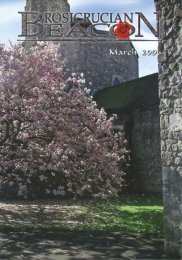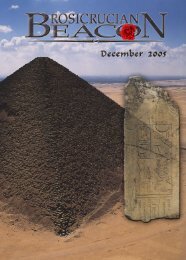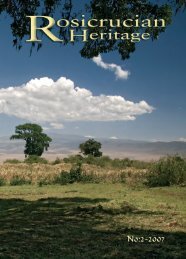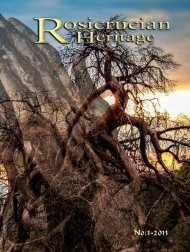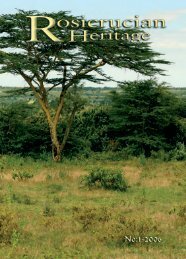Klaas-Jan BAKKER - AMORC
Klaas-Jan BAKKER - AMORC
Klaas-Jan BAKKER - AMORC
Create successful ePaper yourself
Turn your PDF publications into a flip-book with our unique Google optimized e-Paper software.
schools and the comments that have been made<br />
concerning them, because the influence of such a<br />
teacher is more misleading than it is helpful.<br />
The Fifth Duty<br />
The student seeking knowledge must not allow<br />
any kind of praiseworthy knowledge to escape him<br />
without carefully examining it, in order to become<br />
familiar with its aims and purposes. Should time<br />
permit, he should take it up in detail. Otherwise,<br />
he should address himself to and master the<br />
most important while acquainting himself with<br />
the rest, because the different branches of<br />
knowledge are both supplementary to one<br />
another and closely interrelated.<br />
Besides, one of the immediate benefits<br />
of such acquaintance is that the student will<br />
no longer be hostile to branches of knowledge<br />
other than his own, a hostility born of ignorance<br />
because ordinarily, men are enemies to the things<br />
they do not know. Knowledge, whether higher<br />
or lower, either leads men to God or helps them<br />
a little on their way. In this respect, knowledge<br />
is classified in relation to its ability to draw them<br />
nearer to their goal, namely God, or how far it can<br />
send them away from that goal.<br />
The Sixth Duty<br />
The student must not study every branch of<br />
knowledge at the same time, but should observe<br />
some kind of order and begin with the most<br />
important. Life is ordinarily too short to enable a<br />
person to pursue all the branches of knowledge. It<br />
is therefore wise to acquire the best of everything,<br />
satisfying oneself, so to speak, with the mere<br />
tasting of it; at the same time directing whatever<br />
power one has left, after having obtained all<br />
available knowledge, towards mastering that<br />
A large stone placed in honour of al-Ghazali in Mashhad, the capital<br />
of the Khorasan province.<br />
noblest of all sciences, the science of the hereafter,<br />
including the science of practical religion as<br />
well as the science of revelation. The goal of the<br />
Science of Practical Religion is revelation, and the<br />
goal of revelation is to know God.<br />
The student must work hard to possess that<br />
secret that is not found in the paraphernalia of<br />
the jurisprudents and theologians, and which he<br />
cannot attain except through diligent search. In<br />
short, the noblest and highest of all sciences is to<br />
know God. This science is like a sea, the depth of<br />
which cannot be determined. In this science, the<br />
The student’s purpose must be the adornment<br />
and beautification of his inner self.<br />
highest rank is that of the prophets, then that of<br />
the saints and finally those who follow.<br />
The Seventh Duty<br />
No one should study a branch of knowledge<br />
before he has mastered the branch that precedes<br />
it; for knowledge is of necessity so arranged<br />
that one branch prepares the student for the<br />
next. Whoever observes this rule will succeed.<br />
In every branch of knowledge to be pursued<br />
by the student, his aim should be to attain the<br />
one above it. He should never declare a certain<br />
science useless because its protagonists disagree<br />
among themselves or because of the error of one<br />
or more of them, or because with their actions<br />
they violate the ordinances of their own science.<br />
Each case should be determined separately, as not<br />
every branch of knowledge can be independently<br />
mastered by every person.<br />
The Eighth Duty<br />
The student must know how to ascertain the<br />
noble nature of this science, the nobility of its<br />
fruit and the authenticity of its principles, as well<br />
as other sciences. Take, for example, the sciences<br />
of religion and medicine. The fruit of the first<br />
is eternal life, whereas the fruit of the latter is<br />
the physical life; consequently, the science of<br />
religion is nobler. The fruit has priority over the<br />
principles. Similarly, it becomes evident that the<br />
noblest of all sciences is the science of knowing<br />
God, the angels, books and prophets, as well<br />
as that of knowing the path that leads to these<br />
sciences. Seek therefore nothing else and treasure<br />
nothing besides.<br />
42<br />
The Rosicrucian Beacon -- December 2007



